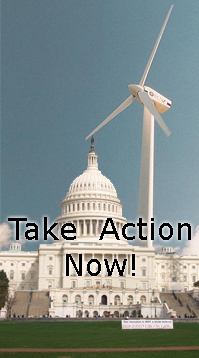
Contact your Senators and urge them to support a Renewables Portfolio Standard (RPS)
This week the Senate will consider energy and transportation legislation that offers a historic opportunity to establish national energy policies that boost renewable energy production, increase energy efficiency, improve vehicle fuel economy standards, and curb global warming pollution. But given that some of the current energy proposals on the table fall short of ensuring consumer and environmental benefits, the Union of Concerned Scientists (UCS) and myself are encouraging senators to strengthen the current proposals and fend off attempts to undermine the positive elements in the proposed legislation.
This is our chance to really change the future of America’s energy usage. We must not allow big carbon, and car companies to set the energy policy of this country.
National Renewables Portfolio Standard (RPS) legislation might come to the floor of the Senate today or tomorrow. Contact Your Senator Today!
Below is a quick overview of the major issues in play:
FUEL ECONOMY
The Senate is considering a bill that calls for increasing the corporate average fuel economy (CAFE) standards for vehicles to 35 miles per gallon (mpg) by 2020. Analysis shows that reaching a fleetwide 35 mpg fuel economy standard in 2020 is easily achievable with conventional technology and would have multiple benefits for U.S. energy, economic and environmental security. (For more on the issue, click here.)
Sen. Carl Levin (D-Mich.) is expected to offer an amendment that would undermine efforts to improve fuel economy. If his amendment is based on a recently circulated draft proposal, it would set feeble targets over an extended timeline. In addition, in lieu of requiring the auto industry to boost fuel economy, it would merely require automakers to make promises to produce a range of vehicle types including flex-fuel vehicles. Legislators also may try to block the Environmental Protection Agency from regulating vehicle global warming pollution or granting a waiver to states who have adopted the California vehicle global warming pollution standards. (For more on Sen. Levin’s expected amendment, go here.)
The Senate should reject any efforts to:
· undermine fuel economy improvements;
· introduce new loopholes allowing automakers to avoid fuel economy requirements; and
· remove regulatory authority to curb vehicle global warming.
RENEWABLE ELECTRICITY STANDARD
Sen. Jeff Bingaman’s (D-N.M.) renewable electricity standard bill, which would require utilities to generate 15 percent of their electricity from renewable energy sources by 2020, has broad bipartisan support. The Senate has passed three similar bills over the last five years. Sen. Pete Domenici (R-N.M.) plans to introduce an amendment that would include nuclear energy and technologically advanced coal plants as “renewable” sources, undercutting demand for the country’s untapped and genuinely clean renewable wind, solar, biomass and geothermal energy resources. We expect that other senators will attempt to lower the standard from 15 percent, despite growing support across the country for state renewable standards. Twenty-three states and the District of Columbia now have renewable energy standards, and Michigan, North Carolina, Virginia and Missouri are considering establishing their own. (For more on state renewable standards, go here.)
A national renewable electricity standard should be a base for bolstering the clean energy industry, not an additional subsidy for coal or nuclear power. Senators should accept the original intent of the program without substantial alteration.
SMART BIOFUELS
While fuel economy is the most effective step the United States can take to reduce national dependence on oil, low and zero-carbon fuel sources for vehicles will be needed over the long term to meet our energy security and global warming pollution reduction goals.
The Senate energy bill contains a provision that would increase the amount of biofuels in the country’s transportation fuel mix. The bill contains a minimum standard that ensures that biofuels maintain current level of carbon emissions benefits, however it lacks additional guarantees to ensure new biofuels technologies meet their carbon reduction potential. Without sufficient safeguards, the bill would leave room for unsustainable production practices that could undermine any environmental benefits from biofuels.
Another possible amendment would allow liquid coal fuel to qualify under the renewable fuel standard, even though liquid coal could produce nearly twice the global warming pollution as diesel or gasoline. Experts point to California’s Low Carbon Fuel Standard as an exemplary model for a system that tracks global warming emissions from alternative fuels. (For more on California’s Low Carbon Fuel Standard, go here.)
Congress should keep liquid coal out of any biofuels initiative. Biofuel policy should focus on developing crop and production choices that would produce the largest fuel yield with the smallest impact on the environment. Senators should support amendments to the biofuels package that would cut global warming emissions and promote sustainable land management practices.
Please contact your Senators and ask them to support a the Bingaman/Reid RPS amendment when the energy bill comes to the Senate floor and to oppose amendments that would weaken the program’s requirements for clean renewable energy.
National Renewables Portfolio Standard (RPS) legislation might come to the floor of the Senate today or tomorrow. Contact Your Senator Today!
Thanks for another very informative post. The inside word on the Bingaman Renewable Portfolio Standard (a strongly positive step) is that the vote will be very tight. If you support this concept, the time to weigh in is right now. You can reach any Senator’s office through the Capitol switchboard at 202-224-3121.
Regards,
Thomas O. Gray
American Wind Energy Association
http://www.awea.org
risingwind.blogspot.com